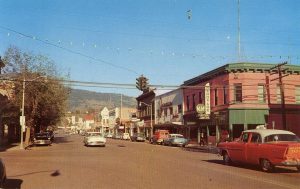By Mary Lloynd – Abbotsford, B.C.
Royal Air Force (RAF) serviceman, Henry Lloynd had to come all the way to Canada to discover his future and it would be me, way back when I was Mary Lazenby.
Stationed in North Battleford, Sask., at #35 Service Flying Training School with the British Commonwealth Air Training Program in 1941, Henry and another service pal stopped in to ask directions from my friend and me to the town dance hall.
We both worked at a diner called the Coffee Shop. It served up ‘egg ‘n chips’ – a standard of many of the English lads from the base. The dance hall was quite a ways. Since we were going there anyway, we took them along with us.
Dating was easy back then. Time was spent at the dance hall, the local diner, the movie theatre, or maybe just window shopping.
I was one of the first three people in North Battleford to contract typhoid in what would become a major epidemic in the city. When Henry found me quarantined in the isolation hospital, he began to walk from the base to town every night. He would sit outside my window and keep me company.
Spent years apart
They tell me that sometimes I was lucid and other times not, but he persisted. I went through weeks of some very bad times. I lost my hair and dropped from 140 to 80 lbs before the disease finally let loose of me. Still, I was more fortunate than many others.
One year later we married and I was officially a War Bride. The plan was for me to follow Henry to England whenever he got posted. We spent two years here before he had to leave his wife and our new daughter and return to Britain. He was posted to India and then British Malaya (now Malaysia). While he was gone, I ran a rooming house out of my father’s home, cooking meals for local workers.
At the end of the war, after an absence of two years, we hatched a new plan. Henry applied to reunite with me in Canada as a War Groom. On the snowy night of his arrival, the town was throwing a party for their returning RCAF servicemen and they pulled Henry right into the fold.
The plan was to assist my father in his blacksmith shop because his health was failing, but hard times meant there wasn’t much for Henry to do. He began hanging around the grain elevator where he learned to grade wheat. Just when things were at our lowest, this new skill led to an offer of employment in a wee little elevator in the middle of nowhere.
We had no car, no phone, and a new baby on the way. We were trying to figure out if we could manage it when the chance of employment in the coal mines of Alberta also came along. Henry set out for Coleman until he could make enough to send for us.
Back to our roots
We joined him there and when the mines started closing down, Henry wanted to return to the first place he’d lived in Canada, so we moved back to North Battleford. We raised our four children there and built a home. Work eventually took Henry to Abbotsford, B.C., where he retired in 1985.
In our 90s now, we still love to travel back on occasion to enjoy our Saskatchewan roots. We have concluded that in our decision to be either a War Bride or War Groom, we made the right one.



